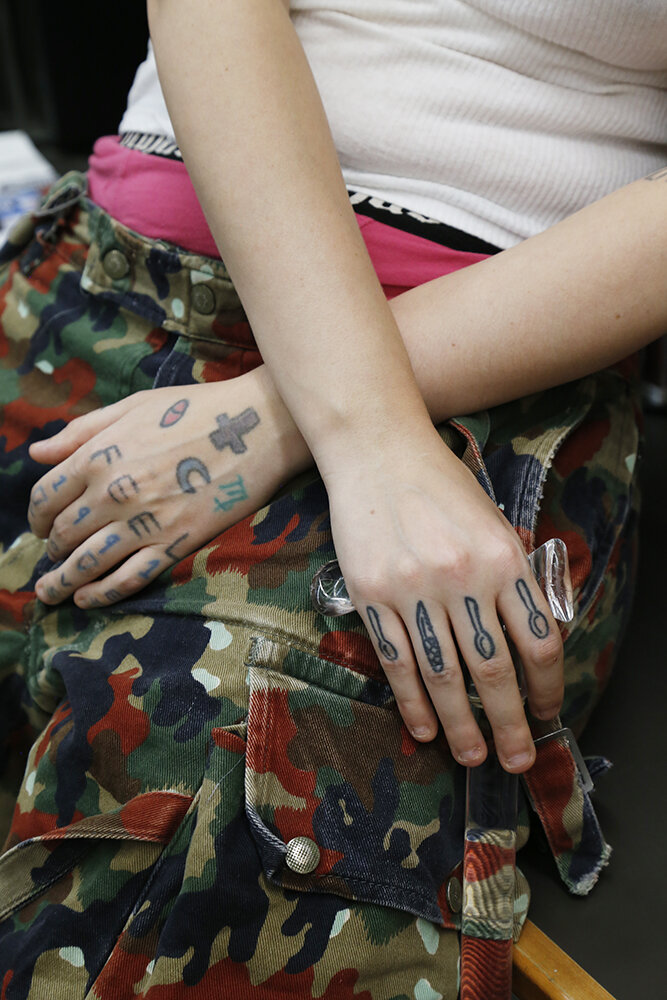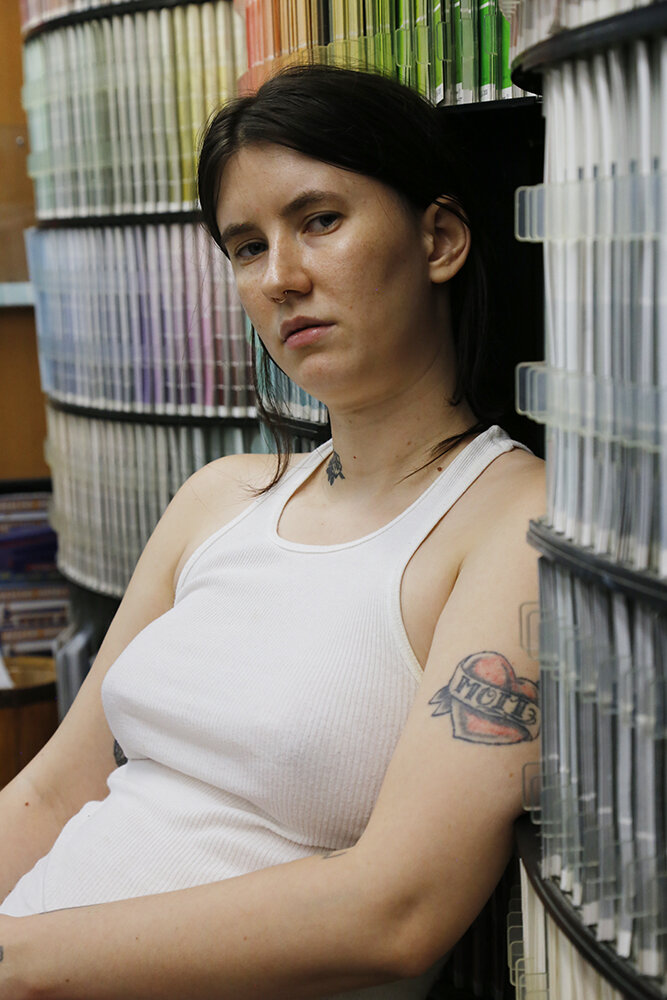INTERVIEW WITH AN ORGANIZER
BEN FAMA IN CONVERSATION WITH RIPLEY SOPRANO
PHOTOS BY MAUREEN DRENNAN
Ripley Soprano is a New York-based writer and organizer. They recently spoke with poet Ben Fama, whose second full-length poetry book Deathwish was published by Newest York Arts Press in June, about their approach to the numerous creative projects and organizing efforts they spend their time on. They were photographed by Maureen Drennan, whose most recent work with Newest York was a seaside dispatch.
An excerpt from Ripley’s first poetry chapbook, Premises, was published by Newest York in August.
The upcoming Shadowbanned party described below, the proceeds from which will be directed to fund sex worker harm reduction efforts, will be held at 444 Club in Bushwick on October 11th, from 10:00 PM to 4:00 AM.
Ben Fama: You do a lot of stuff. You write, you organize, you work with Brujas. Tell me what you’ve got going on right now. Tell me about the “incest” book.
Ripley Soprano: I spent the last several months going through a huge spurt of creative energy where I was making music and putting it out on my Soundcloud, writing and self-publishing my first poetry chapbook Premises, putting out a capsule with the New York-based skatewear collective BRUJAS called OWN GOAL, organizing a party called “Suck Dick Carry Narcan”, and then produced a release party for my chapbook which happened on August 5. That was so exhausting, so I told myself I would take most of August off, which has kinda worked? I’ve been sleeping and spending time with friends.
Now, I’m revving up for a couple of new projects: I’m going to be exhibiting new work on November 1 which will be a culmination of the work I did this year with the Queer/Art Mentorship program where I’ve been working with the incredible scholar Che Gossett. That’s going to be a sound installation and a two-day art installation in the bathroom of the LGBT Center in Manhattan. I won’t give too much away but like most of my recent work, it’s going to be focused around harm reduction. On that note, I’m organizing on a party coming up on October 11 at 444 Club in Bushwick called “Shadowbanned: for fags, whores and prisoners”, where all the money is going to start a sex worker harm reduction project in New York City. I’m very excited about that!
As for the “incest book”, it’s called Bloodlines and is something I’ve been working on with my colleague and co-conspirator Sophia Giovannitti for about a year and a half. It’s a (mostly) non-fiction book project that is part memoir-part history-part smut-part manifesto about the connection between power, capital, and incest. We talk about fanfic, law, film, and our own family histories of both consensual incest and sexual violence in the family. I love working with Soph, she’s an angel and a half and a brilliant talent, I’m always excited to make stuff with her.
BF: There’s a lot going on there! I remember helping you a bit at the first Shadowbanned party. That was a lot of fun, everyone I met was so nice. I still talk to them actually. Can you tell me a bit about the project you are starting?
RS: Haha! Yeah, you were the popper booth boy! We sold 4 huffs of Rush for a $1.
The idea is an experiment that would be a couple nights a week from like 1:00 AM to 4:00 AM distributing harm reduction supplies (lube, condoms, Naloxone, fentanyl testing trips, etc.), hot cocoa and coffee, snacks, and other stuff to street-based sex workers as a mutual aid project. We want to start small and see how it goes, but I don’t know of much happening like this in New York. It’s based on something similar that some friends run in DC. Ideally, it would be a way to both redistribute material resources and also meet people and organize together. It’s kind of a dream right now, but that’s the idea.
BF: That sounds really beautiful and I really hope it happens! Helping other people—that’s the meaning of life.
RS: There’s this quote by Lila Watson, an indigenous activist and artist who me and my friends were really into when I was in high school and doing a lot of post-Hurricane Katrina solidarity organizing, that was like “If you have come to help me you are wasting your time, but if your liberation is bound up with mine, then let us work together.” To me, the most important thing is how to build solidarity across difference. Can you redistribute resources? Money? Labor? Time? Awesome. Do it, but not because you feel like you’re in a position of privilege/advantage, but because you feel like your struggle is inextricably tied with others. Otherwise, that shit is no different than a charity group, or the Jesus woman who stands outside of strip clubs and abortion clinics.
BF: That’s a beautiful quote, it reminds me of some of my favorites. “Ask the friend for love. Ask them again. For I have found every heart gets what it asks for most.” That’s by Hafez. The other is John Ashbery: “There is nothing to do / For our liberation, except wait in the horror of it. / And I am lost without you." One is about asking for help, both involve another person.
Your quote seems to consider self-seeking motivations in organizing and service work as opposed to holding space for the other, seeing them and looking at the world beside them without judgment, respecting their autonomy amid all the contradictions and reversals. It’s like, when someone is out there doing service of any kind, are you trying to get yourself into heaven, or get us out of hell.
RS: I love that Ashbery quote! I had never heard that before now.
Organizing is all about building people’s capacity so they can see their own power and organize themselves. I think it’s rare to see this kind of framework being used in sex work activism because much of the focus is on policy change and voting, especially right now. But in general and in all the organizing I’m doing and have done, I’m really more interested in meeting people’s material day-to-day needs (housing, food, transportation) and trying to support people in building their own autonomy apart from systems of domination and control.
Anyway, although I’m not doing a ton of organizing like I have in the past, I still try to support cool and compelling organizing whenever and however I can, so Shadowbanned is an effort to try to do an aesthetic and cultural organizing project that moves money but is not boring or corny.
Ben, when are we going to collaborate on something? I feel like it would be epic!
BF: I’m always down. As far as boring or corny, a lot of my life is just that, and I’ve learned to embrace it as a kind of truth of organizing, or the truth of good living. Most of the work I do working with others, or spiritual/meditative work, service work—that work is definitely not instagram-ready or twitter friendly, and is actually quite ugly when considered on those terms. I love Shadowbanned because it gets to play on both sides: it has good optics, it is really fun, and it funnels to the cause. I think of my press in similar terms. Recognition causes distortion, I’ve found. It changes the way I make decisions about things.
RS: I love that too, I love ugly stuff, and usually am drawn to “background” work, making stuff happen that isn’t noticed, and doesn’t beg recognition. But I’m also trying to get more comfortable with being noticed for things I’ve worked on because I don’t want to feel small, either.
I tell my friends a lot, like, I want my work and stuff to be stolen. I want these ideas to be proliferated. I try very hard not to work and function out of a place of scarcity but out of a place of abundance. Like, I have an urge, because of the world of clout and social capital and power, to be the only one doing something, but I don’t actually want that. I want to bring people in, turn people on, and turn people out. You know? And whenever I get jealous of other people, their work, their lives, whatever, I take a sip of water and try to see if that’s someone I can earnestly collaborate with. It’s a way of dealing with internal feelings of insecurity, like, maybe what I need is a mentor, or maybe I want to be that person’s friend or maybe I want to make work with them. It’s a more generous and honest way to exist.







